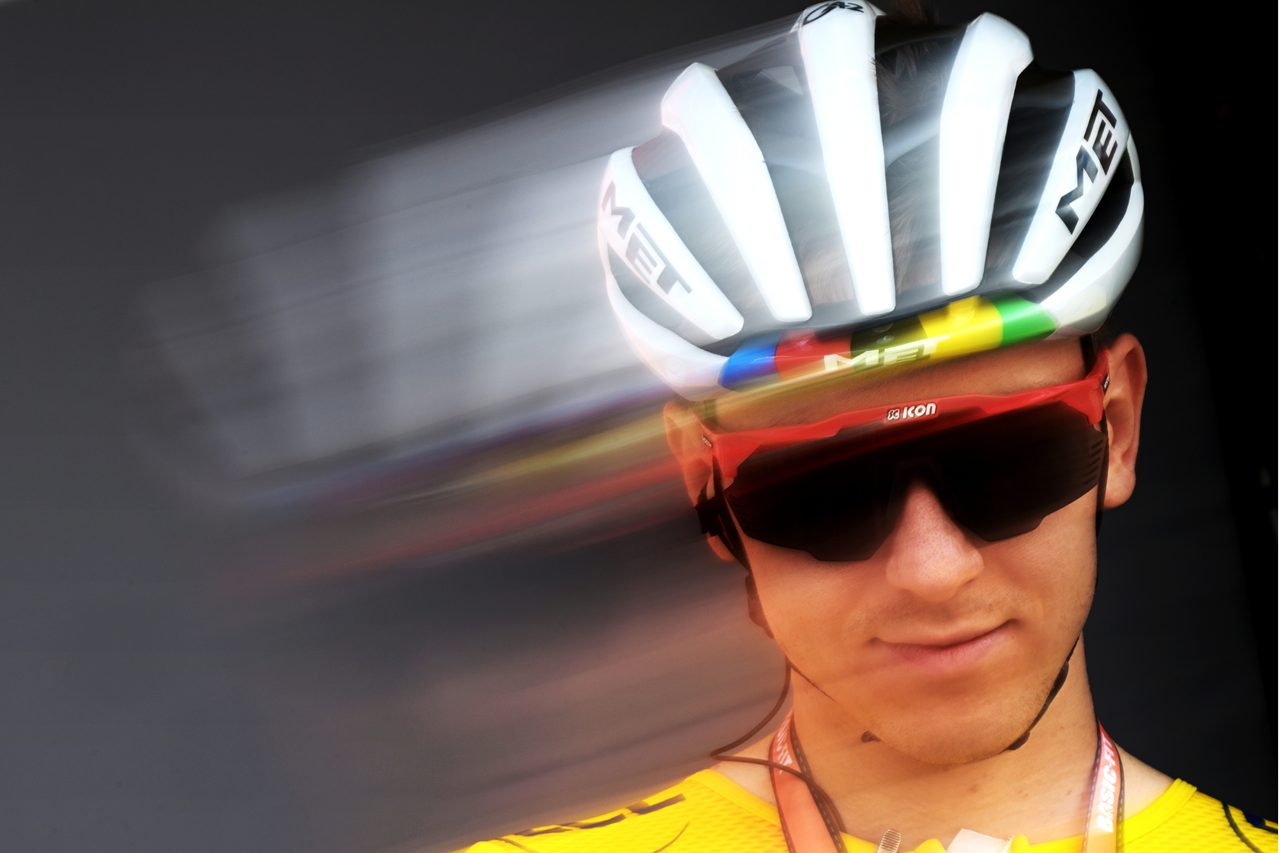
This article was first published in Cycling Weekly magazine in December 2024, in a special edition that commemorated Pogačar winning the Triple Crown. It has been updated to reflect his fourth Tour de France title.
In December 2023, Tadej Pogačar unveiled his bold plans for 2024. He said he would aim not only for the elusive GiroTour double, but also the rare Triple Crown – adding victory in the road race World Championship.
Yet, in his characteristically laidback manner, seemingly unfazed by the weight of expectation on his shoulders, the then 25-year-old seemed not to be taking anything for granted: “[The season] could be super good, really good, or not so good – I won’t say bad, but mediocre.” What transpired went beyond “super good” – it was one of the most spectacular displays of dominance we’ve ever witnessed in pro cycling. It has left fans and pundits asking the inevitable question: is Pogačar the greatest male cyclist of all time – is he the GOAT?
The exceptional nature of his season cannot be overstated. The UAE Team Emirates-XRG rider won six stages and the GC at both the Giro d’Italia and Tour de France – only the eighth male to win both races in the same season. He claimed his first rainbow jersey, won two Monuments, and only failed to win twice in 11 races. Wherever he turned up, from the white roads of Tuscany to an autumnal Canada, he was imperious, winning by huge margins and taking enormous chunks off previous best times on mythical climbs. Even a roaring headwind couldn’t slow him down on the Col du Galibier.
In 2025, he has picked up where he left off: he has won two stage races, and cruised to a fourth yellow jersey. In between, he has claimed a further two Monument titles, and finished second on debut at Paris-Roubaix. He is the dominator who doesn't like anyone else winning.
Pogačar’s performances have supercharged the debate within cycling over whether or not he is the GOAT. Until now the consensus has been that this unofficial honour is held by Eddy Merckx, who won five Tours and Giros and claimed 525 road and track wins in total. The Belgian inherited the GOAT tag from Italian champion Fausto Coppi, but is Pogačar, who turned 26 in September, closing in on the Belgian legend? Are we witnessing the best bike rider the world has ever seen?
School of attack
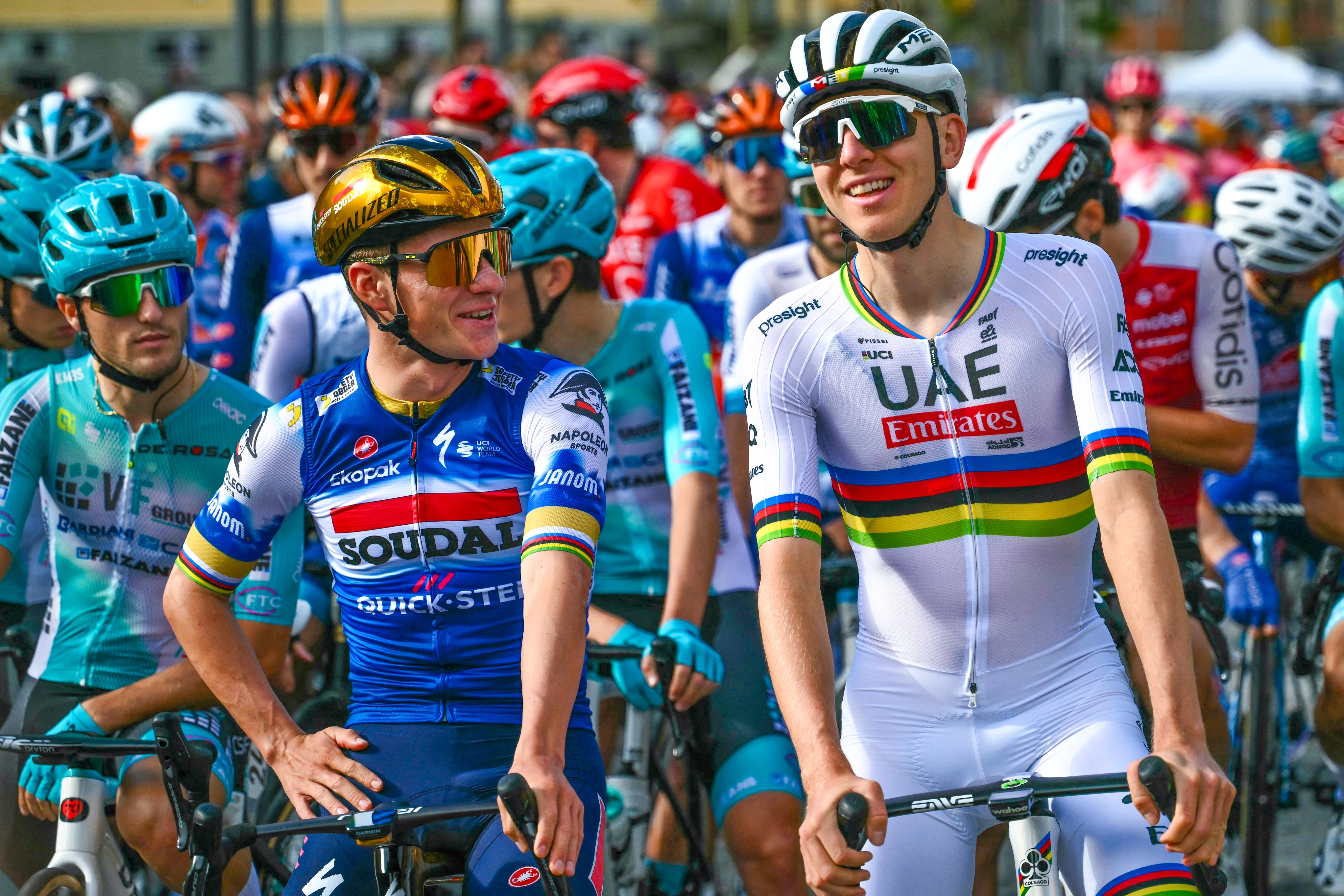
To Merckx, there was only one way to win a bike race: attack. Even when everyone was ganging up on him, attacking remained the best form of defence. Pogačar certainly subscribes to the same school of thought. To quote Remco Evenepoel, arguably Belgium’s most complete rider since Merckx, the peloton awaits Pogačar’s inevitable and bestial attacks like “a ticking time bomb”. You know he will go, but you won’t be able to respond to the detonation, even though you’ve seen the same movie on repeat. It starts with him darting out of the front group, dancing out of the saddle for 30 seconds, and then settling into an unmatchable rhythm.
“What makes him so good is how he attacks from afar,” says Wout Poels, a veteran of the peloton. “A hundred kilometres to go in the Worlds – everyone says, ‘Are you crazy, what are you thinking?’ But then he does it. He’s superhuman.” In 2024, the long-range move became Pogačar’s trademark: the Worlds; 81km at Strade Bianche; 49km at Il Lombardia; and 35km at LiègeBastogne-Liège. “You’re suffering, really suffering,” Poels describes trying to hold the Slovenian’s wheel, “and then he attacks when you’re already on the limit. It’s so impressive. People on TV are watching and asking why no one follows him, but no one can follow him.”
Ben O’Connor tried to react to a Pogačar attack on stage two of the 2024 Giro d’Italia, but his bravery backfired. “When you sail too close to the sun, you get stung,” the Australian said afterwards. “I always wanted to try and follow Pog, but I was the dumbest guy in the race.” The mind-boggling long-distance attacks have become less frequent in 2025 – though they still appear on occasions – and replacing them has become a more matured, conservative approach. He's more about taming and stifling his rivals, rather than punishing them.
Regardless of the new-found attitude, teams are still rethinking expectations. “I know people hate the defeatist attitude, but the race is for second now,” George Bennett, a one-time Pogačar team-mate, said earlier in the 2024 season. Studious French rider and part-time philosopher Guillaume Martin expressed similar thoughts: “Before, I always used to ride races to win; now I don’t see how it could be possible when you are racing against a rider like that.” Pogačar has fundamentally altered race dynamics.
And much like Merckx, he doesn’t only win up mountains. He wins time trials, overpowers cobbles, and has even won the odd bunch sprint. Three-week Grand Tours, shorter stage races and one-day races, Pogačar does it all.
Incredible recovery
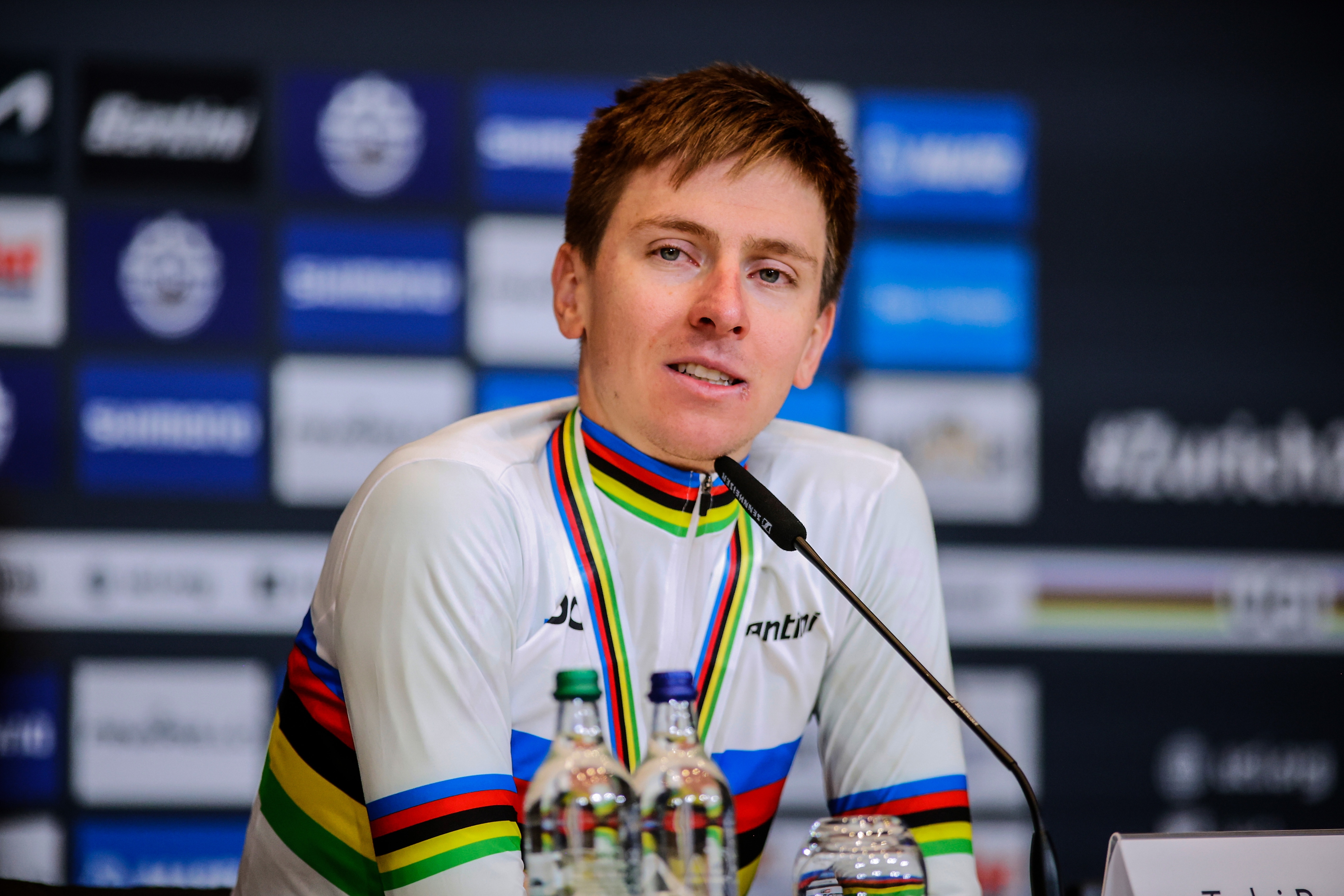
Since 2021, the Slovenian has been the UCI’s best-ranked rider every season, winning on average 14 races a year. To produce that consistency, a rider needs two key physiological traits: durability and a fast recovery. Pogačar has both in abundance. “Tadej has this incredible innate ability to adapt and recover from big training loads better than anyone I’ve ever come across before,” says Jeroen Swart, UAE’s head of performance. “We observed it in 2019 [his first season as a pro] when we were looking at his metabolic markers and recovery, and it’s only improved.”
This, married to the apparent good fortune of rarely crashing or getting ill – with the exception of a broken wrist sustained at Liège-Bastogne Liège in 2023 – Pogačar has avoided the darker realities of his profession. His team has been able to predict his success with uncanny confidence. “At the start of the year, on paper at least, we thought Tadej had a high probability of winning between 83 and 90% of all stages he’d compete in,” says Matxin Fernández, UAE’s sports manager. It’s a staggering win rate, underscoring his superiority. “When Tadej is racing, everyone’s so motivated,” his teammate Tim Wellens says. “You notice it with the staff as well – everyone’s operating at the highest level.”
Despite relentlessly winning since Pogačar turned pro, UAE started afresh with his training 12 months ago, convinced that they could elicit even bigger gains from their prized possession. “We looked at Tadej’s durability in 2022 and 2023, and we understood that it was not at the level required,” Swart says. “We looked at some of the factors at play and did some interventions to correct this.” Hurt by losing two successive Tours to Jonas Vingegaard – the only rider who’s figured out a way to best him in the mountains – the buy-in from Pogačar was absolute. Under the guidance of his new coach, the biomechanics expert Javier Sola, that meant more time riding at low cadences; more time riding high-intensity intervals; the incorporation of functional strength training off the bike; changes to diet; a combination of heat training while at altitude, and more of it closer to big events; and physio sessions at home. “There are multiple factors accumulated together that explain the improvement in performance we’ve seen this year,” Swart says. “Javier does a fantastic job and he has been responsible for the turnaround in Tadej’s performance.”
A single-minded determination to improve is a hallmark of sporting greats, setting them apart from lesser champions – and Pogačar is ravenous in this respect. “I’ve arrived at this point where I really strive to be the best ever,” he told CW at last March’s Volta a Catalunya, later revealing that he and his team had devised a plan to win every race on the calendar, with the exception of the sprinters-only events.
“The most beautiful thing about Tadej is that he welcomes this responsibility of new challenges and new motivations,” Fernández adds. “Why go to the UAE Tour when he’s won it twice? Go to Ruta del Sol instead. Why win Tirreno-Adriatico three times? Go to Paris-Nice and win that.” The messaging is unambiguous: he wants to leave an indelible mark across the world, leaving no race unconquered.
Science versus superstition
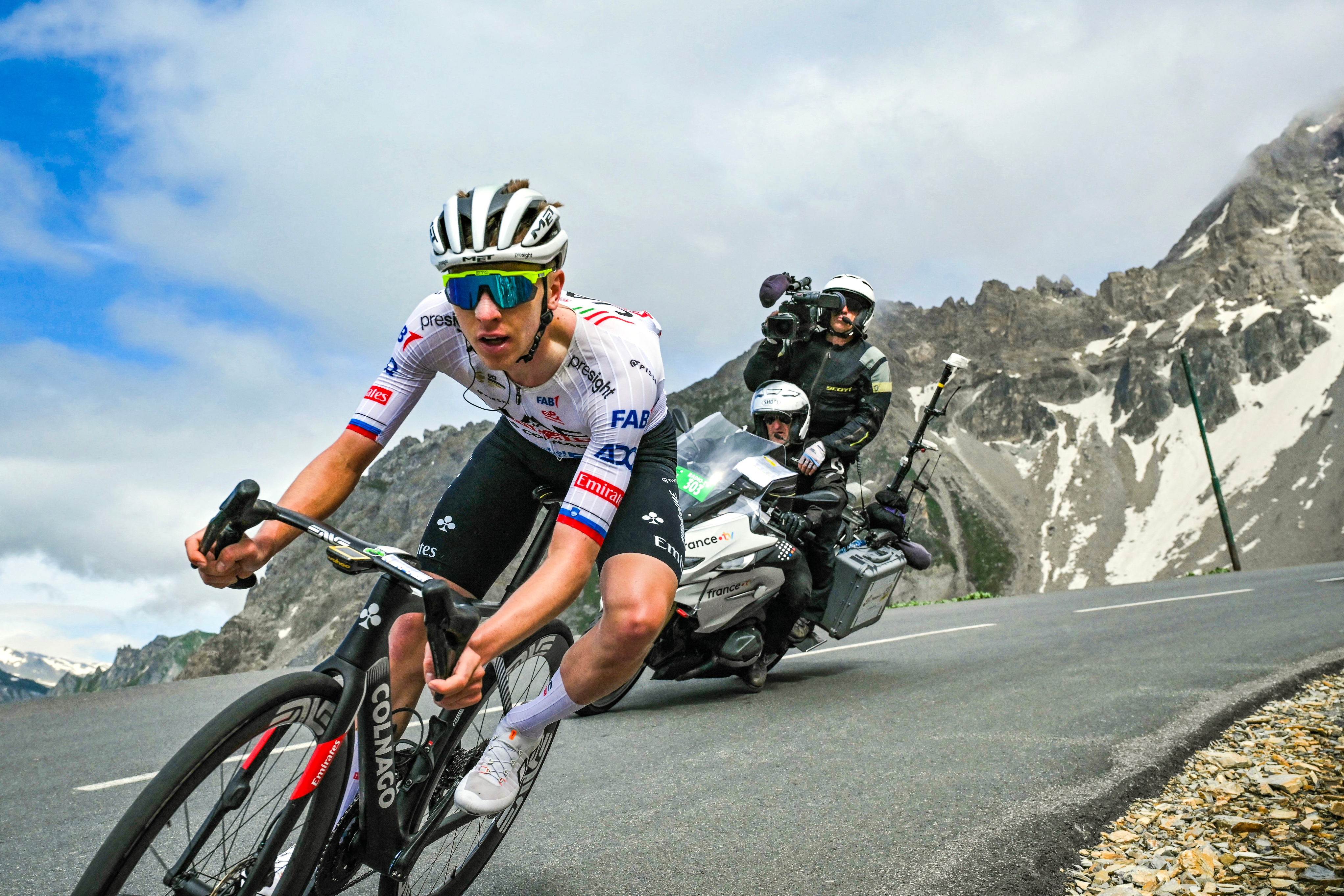
In debating whether he is already, or will be, the GOAT, comparisons with previous generations cannot be avoided. In Merckx’s era, the science of cycling was in its infancy, and riders relied on training plans that amounted to guesswork, drawing as much on superstition as on evidence. With no power meters, GPS or heart rate monitors to track performance, training intensities and recovery strategies were estimated based on feel alone. The potential of today’s top riders like Pogačar is nurtured with scientific precision, each unit of training carefully tailored and monitored. This knowledge gap arguably makes Merckx’s dominance even more extraordinary, as he relied on raw talent, relentless drive, and intuition to stay ahead and keep winning. How today’s riders would cope under such conditions is one of many imponderables in this debate.
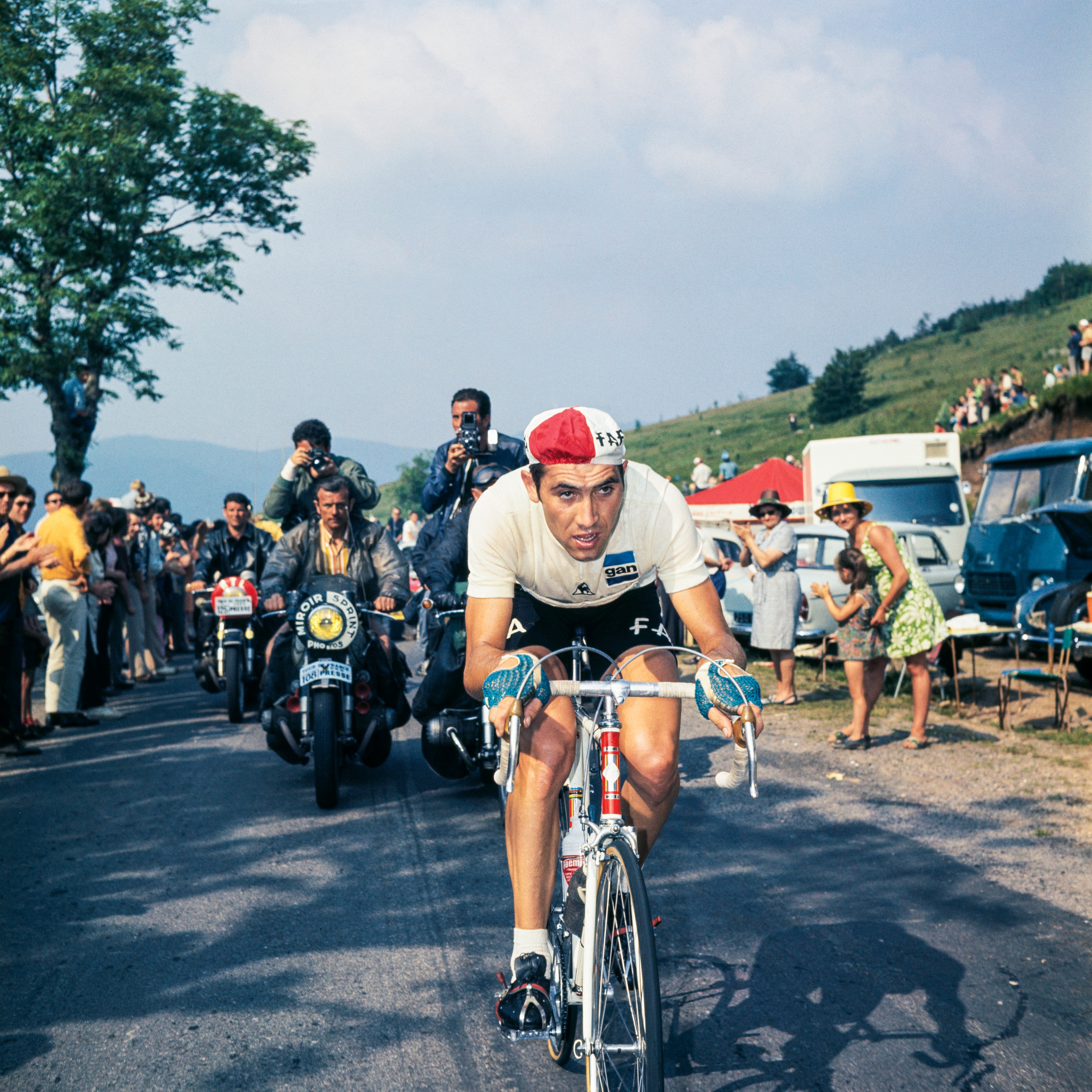
Another one is the influence of financial incentives. Pogačar earns an annual base wage of €8.4m with UAE Team Emirates-XRG plus bonuses for major wins, and private sponsorship deals. The rewards are vastly larger than they were in Merckx’s day. The Belgian told the Guardian in 2013 that, had he been paid well, he would have raced less, adding: “You had to ride a lot back then to make money… Sometimes I would get the equivalent of €25 to enter a race and €15 prize money.” For Pogačar, it must ease the pain of day in, day out hard exertion to know that he is riding himself into fabulous wealth.
Then again, the greater resources in the sport arguably makes winning even harder for today’s generation, with greater pressure too. There is more money in the sport, more development, more youngsters trying it out, and therefore the overall level and depth of competition has markedly improved.
The nearly 1,000 riders in the WorldTour and ProTeam categories are consummate professionals by necessity. They weigh every gram of food, they abstain from drinking, and their training schedules are personally tailored to optimise their output. This applied to very few riders 15 years ago, let alone half a century ago. Winning a bike race has never been harder; winning 25 in 57 race days, as Pogačar did in 2024, is mind-blowing. His rate in 2025 stands at 15 wins in 43 days. Not quite as prolific, but astonishing all the same.
Equally astounding are the performance metrics that illustrate Pogačar’s eminence, especially his climbing times from 2024. On the Tour stage to Plateau de Beille where he ascended the 15.5km Pyrenean beast almost four minutes faster than Marco Pantani’s 1998 record, he rode at an estimated 6.98 watts per kilogram.
“We all witnessed one of the best performances on a climb ever,” Pogačar said afterwards. “I had the highest numbers ever in my career.” Merckx didn’t ride with a power meter (they were only invented in the early-Nineties), but did once produce 455 watts on an ergometer for one hour – roughly 6.25W/kg. Pogačar’s sustained power on Plateau de Beille, some 0.75W/kg more, is unprecedented. His other training data is also remarkable – he’s said to have a VO2 max of 90ml/kg/min – especially high but not enough to account for his dominance – and he recently revealed that his Zone 2 equates to 320-340W, which he sustains for up to five hours. Remarkable figures.
No pressure then
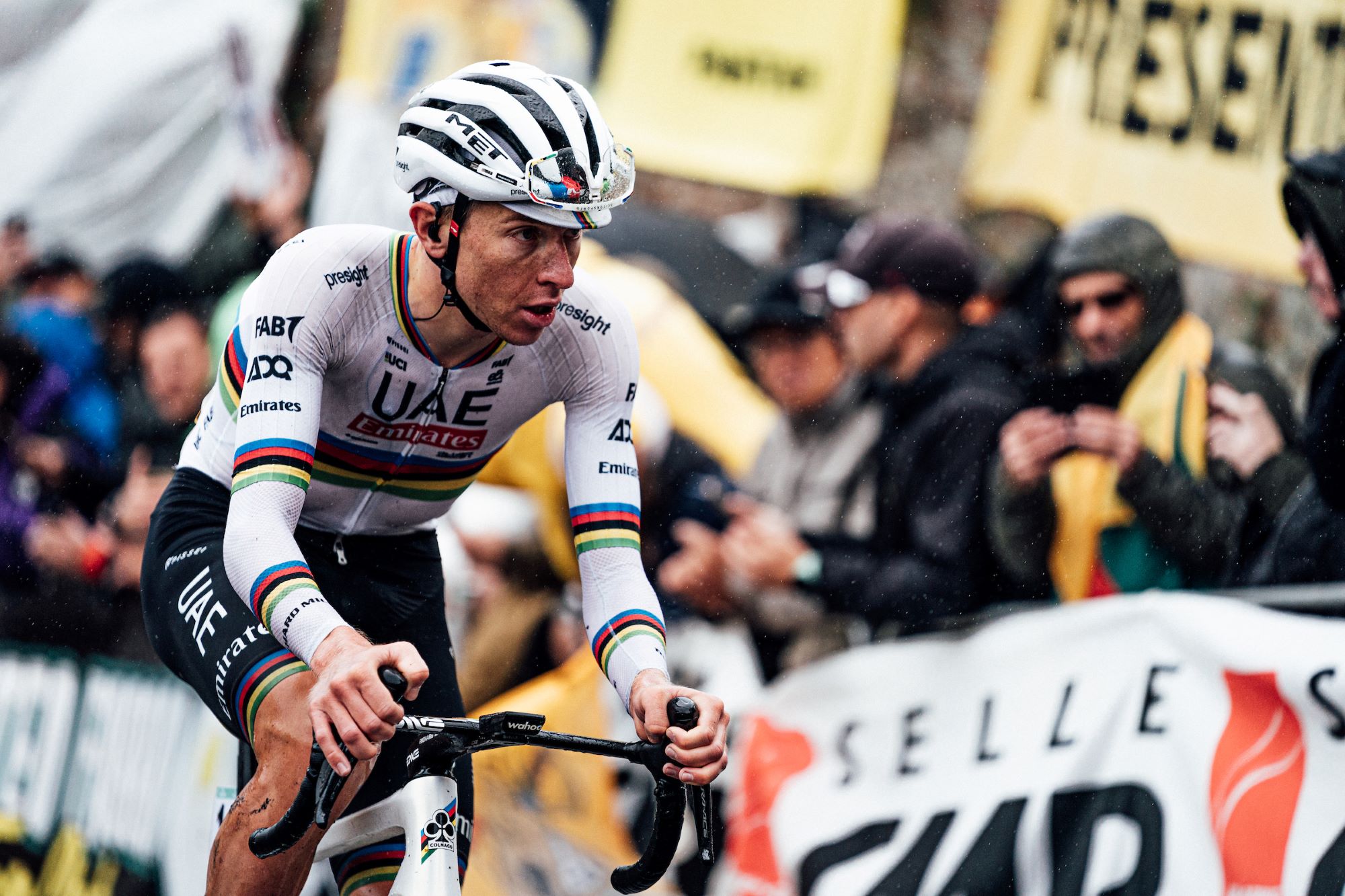
Pogačar’s physical attributes are plain for all to see, but his strongest facet is hidden from view – it’s his mental fortitude. “How he confronts responsibility, stress, pressure, favouritism, tension, nerves, this is his secret – he manages it all excellently. This is the best thing about Tadej,” his team manager Fernández says.
It is something repeated about Pogačar again and again: pressure, what pressure? “He’s super, super relaxed and never stressed before a race,” fellow Slovenian Domen Novak says. “He trusts himself that he’s the best. He just says, ‘Yeah, we smash this, no worries guys, let’s go.’”
Wellens concurs: “What surprises me most about Tadej is how down-to-earth he is, how his feet stay on the ground. He’s taught me that not being 100% serious isn’t a bad thing, you can have a laugh as well. It allows him to stay so mentally fresh and he never puts pressure on himself.”
What about in the rare case where he suffers a defeat? “He’ll never lose his head, never say anything out of character,” says his longtime soigneur Joseba Elguezabal. “Second is the worst result for him, but he’s always calm, respectful, humble, happy, and smiling.” Fernández nods: “In most cases, the team races for him, and he is conscious of that responsibility, but if things don’t work out, it’s never a drama. It’s a big motivation if he doesn’t win but he never takes defeat as a problem.” And why would he? He’ll just win the next one.
“I don’t think he’s angry if he loses because he’s won so much stuff,” says Jayco-Alula’s Michael Matthews, his favoured training partner in Monaco, where he lives. “After I won GP Québec [in September], he came to my room and was openly happy for me. It doesn’t mean everything to him. He’s really good at turning the page.” A fortnight later, Pogačar won the World Championship. Point proven.
Bumps in the road
Double Olympic champion Remco Evenepoel echoes many when he says that his friendly foe is “slowly becoming the best ever”. Even so, there are potential problems along the way that could thwart his crowning as the greatest ever, including how he continues to manage the extra attention from his now global fan base.
“The biggest difference between the beginning and the end of this season is how much of a superstar Tadej has become,” Wellens says. “It’s enormous. People don’t leave him alone, not in the cafe, not when he stops to have a pee. He can’t get mad with people, but we as team-mates need to protect him, because it’s a lot of stress.”
The biggest threat to his continued success, though, is a change in fortune – if, for example, he suffers a serious injury or repeated illnesses, or just setbacks that could derail his march towards cycling immortality.
Perhaps the hardest question mark to shake surrounding Pogačar’s status and how his greatness will be ranked is that of plausibility. Can his dominance be believed? Is this a clean era of cycling? He is insistent that cyclists “should avoid grey areas”, but got himself twisted in knots in the summer over the controversial but legal practice of repeated carbon monoxide inhalation, a method the UCI has since banned.
Not a shred of evidence has been produced to substantiate doping rumours – and many are content to believe he is a generational talent backed by the sport’s wealthiest ever team – but he is surrounded by people with a tainted past, in particular UAE’s manager Mauro Gianetti. The Swiss has presided over the careers of several riders who were banned for doping, and as a rider himself he spent 10 days in intensive care, reportedly as a result of unkowingly being given performance-enhancing drugs.
One fellow cycling manager, Frenchman Stéphane Heulot, told L’Équipe in 2011 that “doping is so ingrained in certain managers, like Gianetti, that they can’t conceive of cycling any other way.” But unless Pogačar tests positive for a banned substance – bearing in mind he is one of the most tested athletes in the world – we can only accept his word that he is a clean athlete.
What does count against him in the GOAT debate, though, is his empty palmarès when it comes to different disciplines. Merckx would turn up at six-day track events in the winter, win countless Madison and omnium titles, pick up European and national medals on the boards, and even set an Hour record that stood for 12 years.
Pogačar has expressed no interest in emulating such feats, saying recently that Filippo Ganna’s Hour record distance of 56.792km was insurmountable. “Before [Ganna’s mark] I would have considered it, but now not so much. Ganna was fast, incredible,” he said.
It is legitimate to ask, if Pogačar sweeps all before him only on the road, eschewing the honours that he could surely achieve in other disciplines, can he really be considered the greatest bike rider of all time? Versatility, it can be argued, means taming not only mountains and cobbles, time trials and sprints, but mud and velodrome too. In this regard, Merckx is a clear winner.
The new Cannibal?
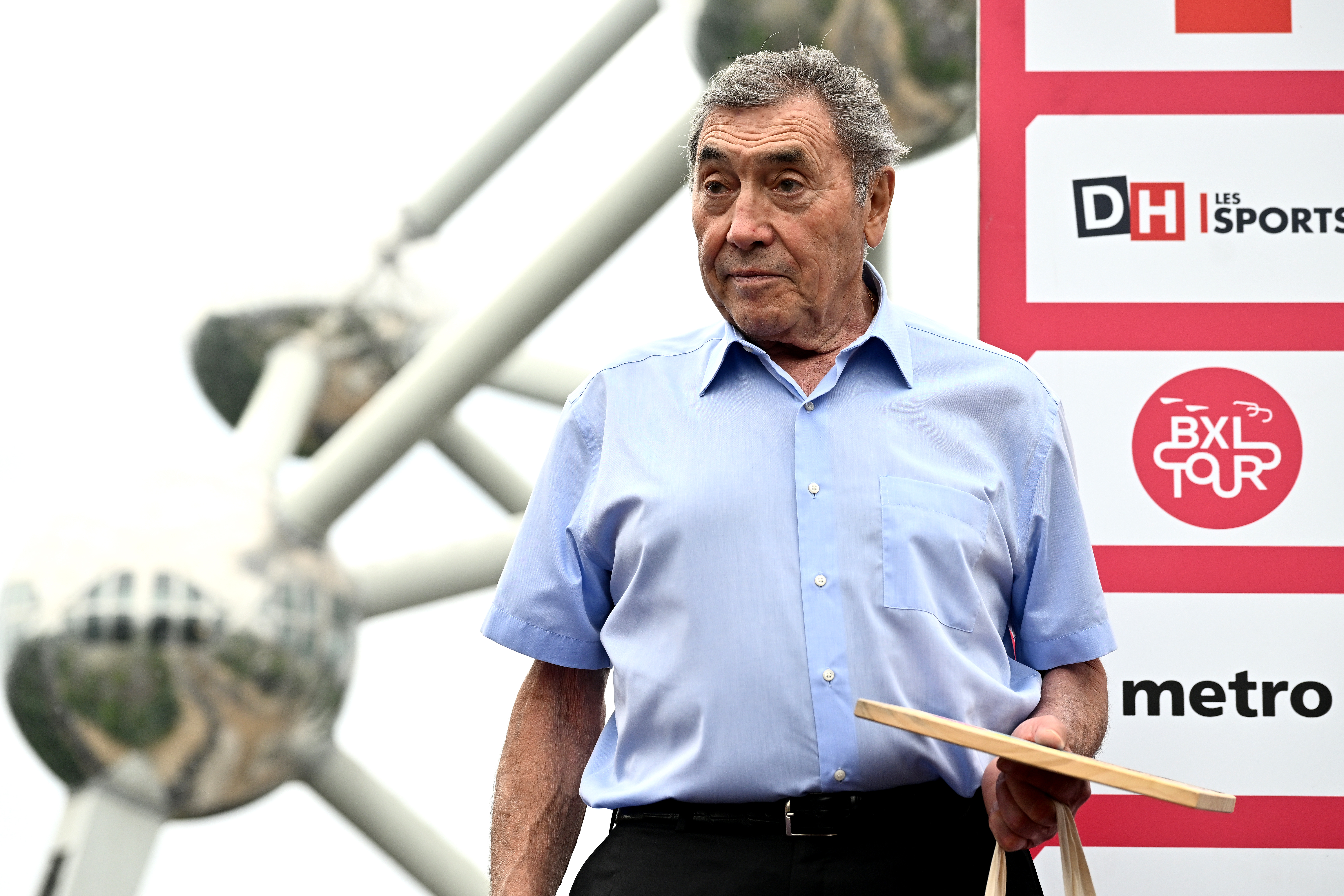
The man arguably best placed to answer the GOAT question is Merckx himself. After Pogačar claimed the triple crown with his Worlds win in September, ‘The Cannibal’ said that “it is obvious he is above me. I have no doubts about that.” But days later he told Spanish outlet Relevo that he was referring only to the manner of Pogačar’s rainbow jersey win. Of the wider question, “I don’t believe Pogačar is superior to Eddy Merckx,” he stated, referring to himself in the third person. “He has only won three Tours. He’s not yet better than me. He has a long way to go to be better than Eddy Merckx,” he clarified, smiling.
Equalling and then surpassing Merckx’s five Tour titles would be a prerequisite for inheriting the GOAT title, as would completing the Grand Tour set. Pogačar is pondering taking on the Vuelta a España in 2025, the one three-week race still missing from his palmarès. Additionally, there are still two Monuments he is yet to win: the cobbles of Paris-Roubaix, a race not typically won by riders with his physique but a race he finished second in on debut in 2025; and Milan-San Remo, the marathon March race that he’s quipped will be “the one that’s going to send me to the grave”. His last four finishes at at San Remo read: 5th, 4th, 3rd, 3rd. So close, yet so far.
Dynasties are formed not by oneoffs, but by dominance spread over a career. Look at Merckx’s 11 Grand Tours, and 19 Monuments. So if and when Pogačar ticks off all those outstanding races, the subsequent challenge will be to win them again, multiple times over. He would also need to chase milestones like the Tour de France’s alltime stage win record – which Merckx jointly held with Mark Cavendish until this year. Pogačar has 21, 14 shy of Cavendish’s 35. “He’s still motivated to keep on winning more and more,” says Wellens. Is he the greatest ever? History will be the judge.
Career timeline
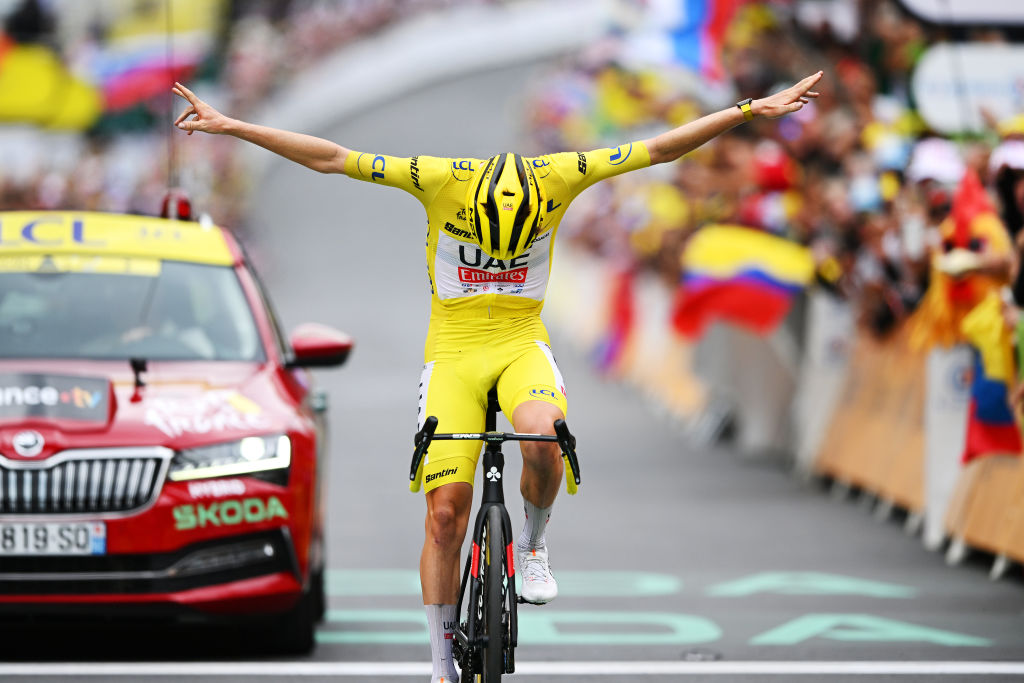
- 2018, Second year U23 rider (Age 19)
- Wins Tour de l’Avenir
- 2019 Turns pro with UAE Team Emirates (Age 20)
- Wins February’s Volta ao Algarve, his second pro stage race
- Wins Tour of California
- Wins three stages and fi nishes third at Vuelta a España, his maiden Grand Tour 2020 First yellow jersey (Age 21)
- Wins two stages and GC at Volta a Valenciana
- Wins three stages and the GC at the Tour de France, overturning 57s deficit to Primož Roglič in penultimate day time trial
- 2021 Dominance begins (Age 22)
- Wins UAE Tour and TirrenoAdriatico in the spring
- Wins first Monuments: Liège-Bastogne-Liège and Il Lombardia
- Wins second Tour de France by five minutes, taking another three stages
- 2022 Meeting his TdF match (Age 23)
- Wins UAE, Tirreno and Tour of Slovenia in first half of season
- Wins three stages of the Tour, but finnishes second to Jonas Vingegaard by almost three minutes
- Wins Strade Bianche, GP Montréal and Il Lombardia
- 2023 The one-day racer (Age 24)
- Wins Ruta del Sol and ParisNice, his only short stage races
- Wins Jaén Paraiso, Tour of Flanders, Amstel Gold, Flèche Wallonne, Slovenian nationals, and Il Lombardia
- Wrist injury hampers his Tour build-up, and loses race by 7:29 to Vingegaard, but still wins two stages
- 2024 The greatest ever season? (Age 25)
- Wins six stages, mountains classification and the pink jersey at the Giro d’Italia by almost 10 minutes
- Wins six stages and third yellow jersey at the Tour
- Wins Strade Bianche, LiègeBastogne-Liège, GP Montréal, Giro dell’Emilia, Il Lombardia, and World Championship
- 2025: the dominator (Age 26)
- Wins third UAE Tour.
- Wins Strade Bianche, Tour of Flanders, Liège-Bastogne-Liège and La Fleche Wallonne.
- But two Monuments desert hm: he finishes seocnd in a memorable Paris-Roubaix debut, and third at Milan-Sanremo.
- Wins Critérium du Dauphiné before cruising to a fourth Tour de France title.
MERCKX'S Biggest Wins
1966 |
1967 |
1968 |
1969 |
1970 |
1971 |
1972 |
1973 |
1974 |
1975 |
1976 |
|
Tour de France |
x |
x |
x |
x |
x |
||||||
Giro d’Italia |
x |
x |
x |
x |
x |
||||||
Vuelta a España |
x |
||||||||||
World Championship |
x |
x |
x |
||||||||
Milan-San Remo |
x |
x |
x |
x |
x |
x |
x |
||||
Tour of Flanders |
x |
x |
|||||||||
Paris-Roubaix |
x |
x |
x |
||||||||
Liège-Bastogne-Liège |
x |
x |
x |
x |
x |
||||||
Il Lombardia |
x |
x |
POGAČAR'S BIGGEST WINS
2019 |
2020 |
2021 |
2022 |
2023 |
2024 |
2025 |
2026 |
2027 |
2028 |
2029 |
|
Tour de France |
x |
x |
x |
x |
|||||||
Giro d’Italia |
x |
||||||||||
Vuelta a España |
|||||||||||
World Championship |
x |
||||||||||
Milan-San Remo |
|||||||||||
Tour of Flanders |
x |
x |
|||||||||
Paris-Roubaix |
|||||||||||
Liège-Bastogne-Liège |
x |
x |
x |
||||||||
Il Lombardia |
x |
x |
x |
x |







